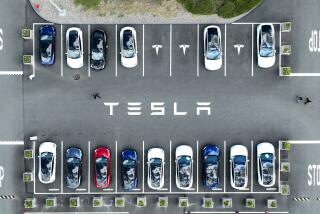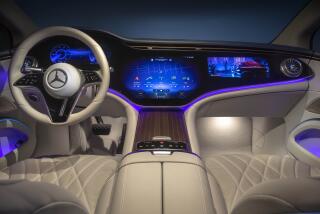Electric vehicles help automakers bring shoppers to showrooms
Electric vehicles are giving automakers a boost — in marketing appeal.
Although sales haven’t exactly been electrifying, the vehicles are helping auto companies draw more shoppers to their showrooms, something that would not have happened without the curiosity over the new autos.
“There is such a halo effect,” said Oliver Hazimeh, an automotive industry consultant at PwC’s PRTM Management Consulting. “These cars appeal to the cool tech-savvy consumer segment.”
Just having those vehicles in the showroom can translate into sales of other models, Hazimeh said. Shoppers come in to check out the electric vehicles but then drive off with something else if they find they can’t afford the premium for the new technology.
Electric vehicles also are helping both Chevrolet, which makes the Volt plug-in hybrid sedan, and Nissan, manufacturer of the all-electric Leaf, win customers from other brands, according to an analysis of initial sales data by auto information company R.L. Polk & Co.
Through the first nine months of this year, Chevrolet has sold just 3,895 Volts and Nissan has sold only 7,199 Leafs, according to Autodata Corp. By comparison, Chevrolet sells about 20,000 of its similar-sized Cruze sedans every month.
But the Volt is a lot more likely to attract the attention of a shopper who previously didn’t consider Chevrolet. About 78% of Volt buyers — based on data from the first half of this year — didn’t own a Chevrolet at the time of the purchase, said Barbara Keys, a Polk consultant.
That means that the Volt is luring customers of other brands at almost twice the rate of other Chevrolet models. On average, 43% of Chevrolet buyers are so-called conquests.
The Leaf has an even stronger trend line for sales conquests over other brands.
About 90% of Leaf buyers didn’t own a Nissan previously, according to Polk data. That’s much better than Nissan’s average conquest rate of 52%.
Nissan said that 18% of its Leaf buyers are trading in a Toyota Prius. And 38% are trading in a Prius or another Toyota.
The most frequent car traded in for a Volt is also a Prius, which accounted for 7% of all Volt sales, according to General Motors Co., which owns the Chevrolet brand. German cars also were comparatively frequent trade-ins. The BMW 3 series, the Audi A4 and the Volkswagen Jetta were traded in for a combined 6% of Volt sales, GM said.
About 60% of Leaf buyers live in California. Sales of the car are helped by rules that allow the Leaf with a solo driver into carpool lanes. The Volt is expected to get similar certification sometime next year.
About 37% of Volt buyers are from California, which for decades has been one of Chevrolet’s worst sales regions.
Keys looked at other new models from Chevrolet and Nissan and found that their electric vehicles were attracting customers of other brands in bigger percentages. The Chevrolet Cruze and Nissan Juke, conventional gasoline engine cars and new models, had lower conquest rates of 48% and 65%, respectively.
The Volt and the Leaf, Keys said, “have been successful in bringing new customers to the brand, and that may have long-term benefits in terms of make loyalty and customer retention.”
GM spent $1 billion developing the Volt, a huge investment for a car that so far has sold only a few thousand.
The big investment is starting to pay off for the automaker, said Mark Reuss, president of GM’s North American operations.
“Is the Volt economically good for the company? Yes, we are using the car to change the company,” Reuss said.
The experience building the Volt also translates into better electric vehicle technology — batteries, motors and control systems — allowing GM to push electric and hybrid systems into a broader range of its vehicles, Reuss said.
GM is adding a light hybrid system to its Buick LaCrosse and Regal models, as well as the new generation Chevrolet Malibu that debuts in the coming months, a move that increases fuel economy by 20% to 25%.







